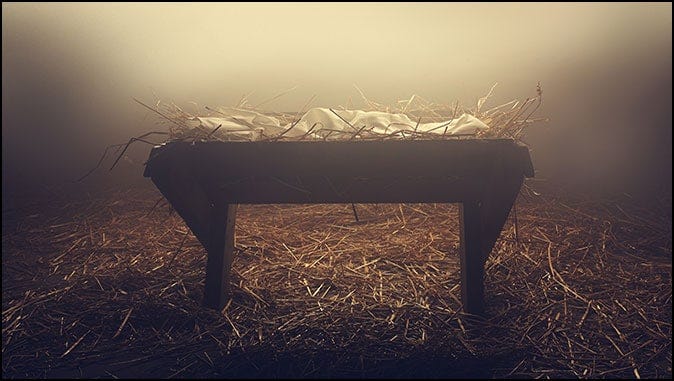In A Manger, The Newborn Messiah
And she gave birth to her first-born son and wrapped him in swaddling cloths, and laid him in a manger, because there was no place for them in the inn
Jesus was born poor and homeless.
How else are we to apprehend this verse from Luke describing the circumstances of His birth?
Commanded by government officials to journey to Bethlehem from Nazareth, Joseph and Mary had no place to stay in Bethlehem when Jesus was born. Even though Joseph was of the House of David, and his “home town” was Bethlehem, no one could put them up even for a night, and so they had to make do in what one would assume was little more than a barn.
There was no doctor attending upon the birth, and the Gospels are silent as to whether there was even a midwife to assist the young Mary in delivering her very first child. Women in antiquity did not receive pre-natal care, nor any of the myriad medical assistances that are commonplace in many parts of the world today, yet even by the standards of the Roman Empire the prospect of a woman delivering her firstborn child in a barn, surrounded by farm animals, is a tableau many of us would view as one of shocking poverty.
Such, we are told, were the circumstances in which Jesus was born into the world.
Yet this birth into the meanest of conditions was a birth still to be celebrated—and which the Gospels tell us was celebrated. It was celebrated by the shepherds told of His birth by an angel. It was celebrated by the magi from the east, who followed a star to Bethlehem.
A child born into absolute poverty was, we are told, celebrated by many. There is no disputing that, with the holiday of Christmas, Christians the world over celebrate the birth of a child born into absolute poverty some two thousand years after the fact.
It is trite and cliche to point out that Christians believe Jesus to be the only begotten Son of God, so of course His birth would be celebrated. Yet the Gospels also teach us that, by being born, the divine Jesus became also the very human Jesus. According to the Gospel of John, by being born God “became flesh”. Jesus’ birth was a very human birth, and it is that very human birth Christians celebrate on the 25th of December every year.
Why would we not celebrate the birth of a new human being—of any new human being, and not only the Son of God? Why would we not regard birth as a miracle all on its own? Out of the womb comes a new life, with as yet unknown potentials and promises—how is this not a cause for celebration and rejoicing?
No mortal child will ever be God’s only begotten Son, yet all children—all people—are the children of God. The Gospels tell us this. If the birth of Jesus was a moment for celebration and rejoicing, surely the birth of any child of God—of any child—is also a moment for celebration and rejoicing?
No one who attended upon Jesus’ birth could possibly have known all that Jesus would do, and all that He would accomplish. Similarly, we cannot possibly know what all children born today will do, and all they will accomplish. Yet there are children being born today who will in time contribute much to the worlds of science, of art, of music, of literature, and of all the many creative endeavors devised by men. We do not know who they are, but it is certain they are out there in the world, and perhaps in conditions not much better than those that were for the baby Jesus.
The angels told the shepherds that Jesus was destined to be a Savior. His birth was a new beginning for the people of Israel, and ultimately for the whole world. Despite being born homeless and poor, Jesus’ birth was the promise of a better world.
Yet are not all births new beginnings? Should we not regard all births as filled with new hope, new potential, new promise? No matter how mean or poor the circumstances, is not every birth at least the hope of a better world?
Today is Christmas. Today we celebrate the birth of Jesus, who, though laid in a manger, was destined to be the Messiah, the Savior of all mankind.
Perhaps, as we celebrate the miracle of Jesus’ birth, we should take a moment as well to contemplate the miracle that is any birth of any child. As we celebrate the birth of the Son of God, perhaps we should remember to also rejoice at the births of all children, of all children of God.
Jesus was born into the world to promise mankind new life. Surely with each new child now being born into this world, God is still making good on that promise.
Merry Christmas.



Merry Christmas Mr Kust!
Indeed. Life is precious because it is made by God.